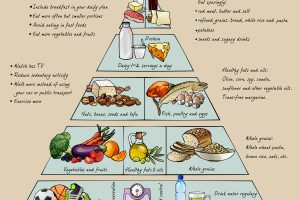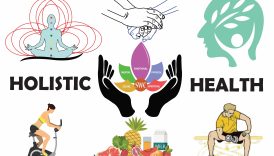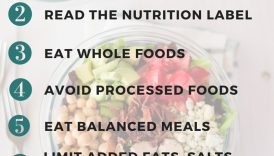Empower Yourself: Envisioning Your Ideal Healthy Lifestyle Plan

Understanding the Importance of a Healthy Lifestyle
In a fast-paced world, prioritizing health often gets pushed to the back burner. However, embracing a healthy lifestyle can profoundly impact both physical and mental well-being. From improved energy levels to enhanced mood, a focus on health can lead to a happier, more fulfilling life. Consider the experience of Sarah, a busy working mom. Initially overwhelmed by juggling work and family life, she decided to prioritize her health. By making small changes, such as incorporating daily walks and preparing nutritious meals, Sarah noticed transformative results. Her energy surged, allowing her to engage more with her children and find joy in everyday moments. The importance of a healthy lifestyle can be summarized as follows:
- Empower Yourself: Envisioning Your Ideal Healthy Lifestyle Plan
- Understanding the Importance of a Healthy Lifestyle
- Setting Your Goals
- Identifying Your Health Priorities
- Creating S.M.A.R.T. Goals
- Nutrition and Diet
- Exploring Nutrient-Dense Foods
- Building a Balanced Meal Plan
- Physical Activity
- Finding An Exercise Routine That Works for You
- Incorporating Movement Into Your Daily Life
- Mental and Emotional Well-Being
- Practicing Self-Care
- Managing Stress Levels
- Sleep and Rest
- Establishing a Healthy Sleep Routine
- Importance of Rest and Recovery
- Social Connections
- Nurturing Positive Relationships
- Building a Support System
- Monitoring Progress
- Tracking Your Health and Wellness Journey
- Celebrating Your Achievements
- Overcoming Challenges
- Dealing with Setbacks
- Staying Motivated
- Self-Care Practices
- Implementing Relaxation Techniques
- Prioritizing Me Time
- Physical Health: Reduces the risk of illness and chronic diseases.
- Mental Clarity: Enhances cognitive function and emotional stability.
- Better Relationships: Encourages social interactions and strengthens connections.
Ultimately, making conscious choices about one’s health can lead to a more vibrant life.
Setting Your Goals
Identifying Your Health Priorities
Once the importance of a healthy lifestyle has been established, the next step is setting clear goals. The first task is identifying individual health priorities. This may vary from person to person. For instance, some may wish to lose weight, while others may want to increase their fitness level or focus on mental well-being. To begin, it can be helpful to ask yourself:
- What areas of my health do I want to improve?
- Am I focusing more on nutrition, physical activity, or mental wellness?
- Are there any specific goals, such as running a 5K or eating more vegetables?
By clarifying your health priorities, you set a strong foundation for actionable plans moving forward.
Creating S.M.A.R.T. Goals
With priorities in place, it’s time to transform them into actionable goals using the S.M.A.R.T. criteria.
- Specific:Clearly define what you want to achieve.
- Example: “I want to exercise three times a week.”
- Measurable:Quantify your goals to track progress.
- Example: “I will walk for 30 minutes every session.”
- Achievable:Set realistic goals based on your capabilities.
- Example: “I will gradually increase my walking duration by five minutes each week.”
- Relevant: Ensure your goals align with your overall health priorities.
- Time-bound:Set a deadline to create urgency.
- Example: “I will achieve this within the next three months.”
By establishing S.M.A.R.T. goals, individuals can navigate their health journey with clarity and purpose, maximizing their chances for success.
Nutrition and Diet
Exploring Nutrient-Dense Foods
With S.M.A.R.T. goals in place, it’s essential to focus on nutrition. One of the best strategies is to incorporate nutrient-dense foods into your diet. These foods provide a high amount of vitamins, minerals, and other beneficial compounds with relatively low calories. For example, leafy greens like spinach and kale are packed with nutrients but very low in calories. Other great choices include:
- Berries: Rich in antioxidants and vitamins.
- Quinoa: An excellent source of protein and fiber.
- Nuts and seeds: Provide healthy fats and essential nutrients.
By incorporating these foods into your meals, you can boost your overall nutrient intake and pave the way for a healthier lifestyle.
Building a Balanced Meal Plan
To further promote health, creating a balanced meal plan is crucial. A balanced meal includes:
- Proteins: Lean meats, beans, or tofu.
- Carbohydrates: Whole grains like brown rice or oats.
- Fruits and Vegetables: Aim for a colorful variety.
Consider a simple meal plan:
- Breakfast: Oatmeal topped with berries and nuts.
- Lunch: Grilled chicken salad with mixed greens and a vinaigrette.
- Dinner: Quinoa stir-fry with a variety of vegetables.
- Snacks: Greek yogurt or fresh fruit.
By crafting a meal plan that includes nutrient-dense foods, individuals can ensure they meet their dietary needs while enjoying delicious meals that support their health goals.
Physical Activity
Finding An Exercise Routine That Works for You
As nutrition plays a vital role in health, so does physical activity. Finding an exercise routine that suits your lifestyle makes it easier to stick with it. To kickstart your journey, consider what activities you enjoy. For instance, if you love being outdoors, hiking or biking might be right up your alley. If group classes excite you, dance workouts or kickboxing could be a great fit. Here are some questions to help zero in on your ideal exercise routine:
- What exercises do I enjoy?
- How much time can I realistically dedicate each week?
- Do I prefer working out alone or with others?
Experimenting with various workouts can help identify what feels the best.
Incorporating Movement Into Your Daily Life
In addition to scheduled workouts, it’s essential to integrate movement into everyday routines. Small changes can create significant impacts over time. Consider:
- Taking the stairs instead of the elevator.
- Walking or biking to nearby destinations.
- Doing a quick stretch or light workout during breaks.
Even short bursts of activity can enhance overall health. For example, a 10-minute walk during lunch can boost energy for the rest of the day. By combining both structured exercises and everyday movement, individuals can cultivate a more active lifestyle that is enjoyable and sustainable.
Mental and Emotional Well-Being
Practicing Self-Care
While physical activity is essential for health, mental and emotional well-being deserve equal attention. Practicing self-care is a powerful way to nurture the mind. It doesn’t have to be extravagant; simple acts of kindness toward oneself can make a significant difference. For instance, Sarah, who struggled with balancing work and family, began to set aside time each week for herself—whether it was reading a book, taking a long bath, or simply enjoying a cup of tea in peace. Here are some self-care practices everyone can incorporate:
- Mindfulness Meditation: Just a few minutes daily can reduce anxiety.
- Journaling: Writing about feelings or experiences can help process emotions.
- Nature Walks: Spending time outdoors can rejuvenate both body and spirit.
Managing Stress Levels
In tandem with self-care, managing stress levels is crucial for emotional health. Identifying stress triggers is the first step. Once recognized, strategies can include:
- Deep Breathing Exercises: Taking slow, deep breaths lowers heart rate and calms the mind.
- Setting Boundaries: Learn to say no to avoid overcommitting.
- Engaging in Hobbies: Rediscovering activities that bring joy can act as a stress reliever.
By focusing on self-care and effective stress management, individuals can enhance their overall mental and emotional well-being, paving the way for a more balanced life.
Sleep and Rest
Establishing a Healthy Sleep Routine
Building on the foundation of mental and emotional well-being, an often-overlooked aspect of health comes into play: sleep. Establishing a healthy sleep routine is crucial for overall recovery and performance. Many people, like John, found that inconsistencies in their sleep schedules led to fatigue and lower productivity. He began to prioritize his sleep by setting a specific bedtime and wake-up time, which greatly improved his energy levels. To develop your healthy sleep routine, consider the following tips:
- Create a Wind-Down Period: Spend 30 minutes before bed away from screens; read or practice relaxation techniques instead.
- Consistent Schedule: Go to bed and wake up at the same time, even on weekends.
- Comfortable Sleep Environment: Ensure your bedroom is dark, quiet, and cool.
Importance of Rest and Recovery
Equally important to sleep is understanding the significance of rest and recovery. Just as muscles need time to heal after a workout, our minds and bodies require downtime to rejuvenate. Incorporate rest days into your exercise routine to prevent burnout and reduce the risk of injury. Consider:
- Active Recovery: Engage in light activities like yoga or stretching on rest days.
- Listening to Your Body: Pay attention to signs of fatigue and prioritize rest as needed.
By valuing sleep and rest, individuals create a solid foundation to support their mental and physical health, leading to better overall wellness.
Social Connections
Nurturing Positive Relationships
Beyond physical and mental health, social connections play a vital role in overall well-being. Nurturing positive relationships can provide emotional support and foster a sense of belonging. For example, Lisa, who felt isolated during a challenging work period, began reconnecting with old friends. Her simple act of reaching out for coffee led to meaningful conversations that lifted her spirits. To nurture positive relationships, consider these strategies:
- Regular Check-Ins: Schedule time to call or text friends regularly to stay connected.
- Attend Social Events: Join local clubs or groups that align with your interests.
- Express Gratitude: Show appreciation for friends and family; a simple thank-you goes a long way.
Building a Support System
In addition to nurturing relationships, building a robust support system is crucial. Surrounding yourself with people who uplift and inspire you creates a powerful network to rely on during tough times. To build a solid support system:
- Identify Supportive Individuals: Recognize those in your life who encourage your goals and well-being.
- Be Open About Your Needs: Communicate your feelings and seek help when necessary.
- Diversify Your Network: Include friends, family, and even colleagues, creating a broader base of support.
By prioritizing social connections and building a reliable support system, individuals can cultivate resilience and foster a healthier, happier life.
Monitoring Progress
Tracking Your Health and Wellness Journey
As individuals embark on their health journey, monitoring progress becomes essential. Tracking various aspects of health and wellness not only provides insights but also keeps motivation high. For instance, Jamie started documenting her workouts and dietary habits in a journal. She discovered patterns that helped her make adjustments, leading to improved energy levels and fitness. Consider utilizing these effective tracking methods:
- Fitness Apps: Use apps to log workouts, meals, and hydration.
- Journaling: Keep a journal to reflect on emotions and experiences.
- Regular Assessments: Schedule monthly check-ins to evaluate your goals and progress.
Tracking provides clarity and can enhance accountability, making it easier to stay the course.
Celebrating Your Achievements
Equally important as monitoring progress is celebrating achievements, no matter how small. Recognizing milestones reinforces positive behavior and fuels motivation. After reaching a fitness goal, many people, like Jamie, treat themselves to new workout gear or a fun activity. Consider these ways to celebrate:
- Reward Yourself: Treat yourself to something enjoyable, like a spa day or a favorite meal.
- Share Successes: Share your milestones with friends or social media for encouragement.
- Create a Vision Board: Use a visual representation of goals achieved to inspire continued effort.
By tracking health and wellness and celebrating achievements, individuals can maintain focus on their goals, promoting a fulfilling and sustainable journey toward better health.
Overcoming Challenges
Dealing with Setbacks
Despite best efforts, setbacks are an inevitable part of any health journey. When faced with obstacles, such as an illness or a busy work schedule, it’s essential to adopt a resilient mindset. For example, after experiencing a minor injury, Matt found himself frustrated but recognized it as an opportunity to explore new forms of exercise, like swimming and yoga. Here are some strategies for effectively dealing with setbacks:
- Acknowledge Your Feelings: Allow yourself to feel disappointed and recognize it as part of the process.
- Reassess Your Goals: Adapt your plans to better fit your current situation.
- Seek Support: Talk to friends, family, or a coach to gain perspective and encouragement.
Staying Motivated
Alongside navigating setbacks, maintaining motivation is crucial for ongoing success. Reflect on your “why”—the reasons you started your health journey in the first place. For instance, Emily kept a vision board of her health aspirations and impactful quotes, which reminded her of her goals during tough times. To stay motivated:
- Set Short-Term Goals: Break long-term goals into smaller, achievable milestones.
- Celebrate Progress: Reward yourself for achieving smaller goals to keep spirits high.
- Create a Routine: Establishing a structured schedule makes healthy habits part of daily life.
By effectively dealing with setbacks and maintaining motivation, individuals can continue to progress on their health journey, turning challenges into opportunities for growth and determination.
Self-Care Practices
Implementing Relaxation Techniques
As part of a holistic approach to health, incorporating self-care practices is essential. Implementing relaxation techniques can significantly reduce stress and promote mental clarity. For instance, after a particularly hectic work week, Anna discovered the joy of guided meditation. Taking just ten minutes each day to focus on her breath helped her regain focus and calm her mind. Here are some effective relaxation techniques to consider:
- Deep Breathing: Inhale slowly through your nose, hold for a few seconds, and exhale through your mouth.
- Progressive Muscle Relaxation: Tense and then release each muscle group, starting from your toes and moving upward.
- Mindfulness Meditation: Focus on the present moment to enhance awareness and reduce worry.
Prioritizing Me Time
In addition to relaxation, prioritizing “me time” is crucial for self-care. Carving out time for personal interests allows individuals to recharge and rejuvenate. For example, Laura set aside Sunday afternoons for her passion—painting. This dedicated time became her sanctuary, offering a creative outlet that helped alleviate stress. To prioritize me time:
- Schedule It: Treat personal time as a non-negotiable appointment in your calendar.
- Engage in Hobbies: Dedicate time to activities that bring you joy, like reading, gardening, or cooking.
- Disconnect: Limit screen time and social media to enhance the quality of your time alone.
Ultimately, by implementing relaxation techniques and prioritizing me time, individuals can effectively nurture their well-being, leading to a more balanced and fulfilling life.




